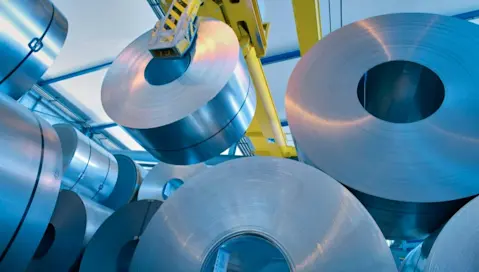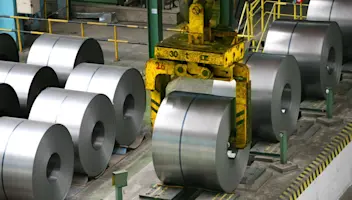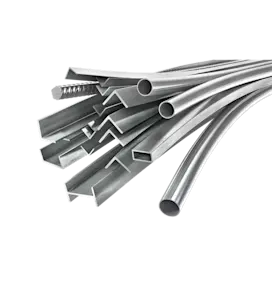Featured in this post
Unleash Your Company’s Full Potential with Fabricated Metals Manufacturing Software
Unleash Your Company’s Full Potential with Fabricated Metals Manufacturing Software
9 Aug 2023
Aptean Staff Writer
The manufacturing process of metal fabrication entails more than just cutting, welding and shaping metal parts—it’s far more complicated, especially if your facility produces a wide variety of products for a broad customer base.
If your fabricated metals company is feeling overwhelmed by the complexities of your manufacturing processes, now is the time to ditch your cumbersome practices and implement an industry-specific enterprise resource planning (ERP) solution.
Many successful manufacturers have already retired inefficient processes and adopted ERP technology to streamline operations. Of the more than 250 manufacturers, including metal fabricators, surveyed by Aptean’s Industry Insights from Industrial and Process Manufacturers, 89% believe that technology is important for working more efficiently, and 45% are already using ERP to improve efficiency.
You may have asked yourself why would you need an industry-specific manufacturing ERP instead of a generic ERP?
Consider from the moment your production team receives an order, plans the production, starts the fabrication process—and until the product is finished—it’s full steam ahead on the shop floor. But excellence in operations isn’t just about efficient production, you also need to make informed business decisions that will directly impact the performance of your business.
Metal fabrication businesses often employ complex models that involve many processes which may result in inaccurate inventory or quality issues, so it’s critical that you have the tools you need from tailored solutions designed to address the unique challenges of your business. You also need insight into your data to inform business strategy and continuous improvement efforts.
While generic ERP solutions have the potential to streamline processes across various industries, many organizations realize in the long run that such “one-size-fits-all" systems fail to address their unique needs—and then the customizations they must then implement cost them more money.
Still not convinced your business needs a purpose-built fabricated metals manufacturing solution? In this blog, we’ll provide seven key reasons why implementing industry-built fabricated metals manufacturing software is necessary, as well as the associated benefits that such software can drive for your organization.
1. Industry-Specific ERP Boosts the Speed of Your Shop Floor Processes
The shop floor is where the real action happens. It’s critical that your resources and processes are in the correct order according to your specifications and run as smoothly as possible. With a tailored ERP solution in place, you can leverage real-time data and automation capabilities to streamline your shop floor processes.
With Supervisor Console and Work Center Console, there’s no need for paperwork in communicating shop schedules, work order instructions and material lists.
Supervisor Console allows you to:
Easily view all shop floor-related information
View production statuses in real-time
Check material status
Release or prioritize work orders
Communicate with the shop floor
Work Center Console allows you to:
View online dispatch list of prioritized work orders
Access all information required for completion of a work order
Record labor and time worked
Issue materials for a work order
Move inventory to finished goods
As transformative as it can be to utilize the functionalities of ERP software for shop floor process improvement, you still need to put in place measures to help prevent unnecessary downtime caused by unexpected equipment malfunctions. That’s a good opportunity to integrate an enterprise asset management (EAM).
EAM can greatly benefit your business by maximizing asset performance, reducing maintenance costs and increasing visibility of maintenance processes—giving you full visibility and control. As an example, Anderson Dahlen leveraged Aptean EAM to help them track breakdowns with great efficiency; that helped expand its engineering team by 900% in six months while streamlining maintenance cost.
“The Aptean Industrial Manufacturing ERP allows us to capture critical information and analytics for improving and further automating business processes.”
2. Industry-Specific ERP Helps You Make Data-Driven Business Decisions
Without the right data, you may lack the clarity and visibility you need to truly understand your company’s financial picture and operational outcomes. When making business decisions, it’s essential that you have all the data from every functional area of your business right at your fingertips in a centralized location.
Fabricated metals manufacturing software can empower you to make smart decisions; calculate profit margins on each job or identify profitability drivers at all levels with the Margin Analyzer tool, which allows users to easily calculate all associated costs for a job and then review and isolate all material, labor, production and subcontracting costs at any time.
With accurate data in real-time, you can make informed business decisions to get the most out of your resources. Like in the case of Boston Centerless, the company was able to leverage Aptean's industrial manufacturing ERP to help them generate competitively priced orders with great accuracy.
“The Aptean Industrial Manufacturing ERP allows us to capture critical information and analytics for improving and further automating business processes, giving us a competitive advantage and helping Boston Centerless earn a reputation for exceptional quality and service.” - Robert Berger, IT Director, Boston Centerless
3. Industry-Specific ERP Increases Your Production Flexibility
Once you accept a job, it’s important that you know the number of people you need for the job, the availability of your machines and the materials you have on-hand. Production scheduling can get complicated if you have multiple projects at the same time and you’re planning and scheduling with manual methods or disjointed software.
Quickly responding to changes can be difficult, especially if you need to adjust several orders with different due dates, you have a limited workforce and the demand is unpredictable. When you’re dealing with a high volume of orders, simply sketching your plans on a whiteboard may lead to inefficiencies and human errors which could cost you money.
Through Aptean Industrial Manufacturing ERP’s advance planning and scheduling module, you can leverage optimization algorithms which are perfect for helping you determine the most efficient schedule and respond to last-minute production changes. That gives you the full flexibility you need to keep your lines running and your customers happy—and with Advance Planning and Scheduling, you can even create “what if” scenarios to model your results and inform delivery dates.
4. Industry-Specific ERP Streamlines Quoting and Estimating
There’s a high chance you’re leaving money on the table if you’re still creating quotes and estimates using Excel spreadsheets or siloed solutions. Spreadsheets are not only inefficient, but they’re also susceptible to user error.
Quoting and estimating functionality within the ERP gives your salespersons flexibility, which allows them to quote and estimate customer products on the fly without the need to involve other departments giving you an edge in consistently bidding for more jobs.
A metals manufacturing-specific ERP solution allows you to make quotes based on available data, including when a product was last built, what parts were used, the time it takes to complete the product and actual cost vs. quote analysis. With all of this data centralized in an ERP platform, you can help empower your sales team during the quoting and estimating process.
If you can quickly give accurate price estimates, you increase your chances of securing new deals and maintaining existing partnerships.
of manufacturers believe that technology is important for working more efficiently
5. Industry-Specific ERP Enhances Visibility Into Your Inventory
Without real-time insight into your inventory, you lack the ability to optimize your manufacturing capacity. Simply put, you can’t build a product and fulfill a customer order if you don’t have the parts needed for production.
Suppose you have excess parts in your inventory—in that case, you could be maxing out your storage space and consuming capital that would be better spent on other important matters. That makes inventory management a key business challenge for many fabricated metal manufacturers.
For operations managers, inventory level and inventory turnover are important measures of performance. It’s critical that you keep your stocks at an optimal level to satisfy customer demand and protect your finances.
Additionally, Aptean Industrial Manufacturing ERP has a tool called “Why Late?” that helps you understand the reasons why some of your processes are behind schedule. With “Why Late?,” you can see which work centers are overloaded and whether material shortages are causing delays, so you can fine-tune your processes to overcome these challenges.
When managing inventory with the right industrial manufacturing ERP, you can:
Optimize inventory levels for production
Save money from inventory and reallocate
Reduce material shortages
Streamline routine tasks
Quickly access inventory vitals
Make better informed stocking decisions
6. Work Seamlessly Between CAD Systems and Industry-Specific ERP
You can further streamline your operations by integrating your Computer-Aided Design (CAD) solution and ERP system. This has the additional benefits of increasing data accuracy and visibility while also eliminating the need to enter data twice.
CAD and ERP integration connects the flow of engineering information and bill of materials (BOM), allowing you to:
Easily view engineering BOM and/or item level discrepancies between CAD and ERP data
Ensure that the information displayed in the drawings always matches the ERP data
Review all engineering and BOM changes and export them easily to Excel or PDF formats
Control the effects on dependent demand planning and how part quantities are calculated for a given engineering BOM
The CadLink tool seamlessly connects with Aptean Industrial Manufacturing ERP, allowing all your departments to work together with the same data.
7. Consistently Produce High-Quality Products With Industry-Specific ERP
To consistently produce high-quality products, it’s essential that you closely monitor manufacturing execution data across your production facility. Your customers will keep coming back if you prove that you’re reliable in producing high-quality products on-time.
Aptean Industrial Manufacturing ERP has built-in quality management functionality giving you advanced monitoring features that:
Track how often quality events occur
Initiate non-conformances and corrective actions
Manage ISO compliance
Your team could be wasting time if they’re still using pen and paper or an outdated legacy system in collecting and analyzing critical data. That makes engaging in digital transformation an urgent imperative for your business.
Achieve Your Fabricated Metal Manufacturing Goals With an Industry-Specific ERP Solution
An industry-specific ERP for industrial manufacturing can help improve the overall performance of your fabricated metal business by boosting the speed of your shop floor processes, enabling smarter decision-making, increasing your production flexibility, helping you generate precise quotes and estimates, providing robust inventory management, integrating CAD and ERP seamlessly, and facilitating the production of consistent high-quality products.
In fact, implementing an industry-specific ERP helped The Metalworking Group achieve their goals. On top of increased shop floor visibility and efficiency, the company was able to improve on-time delivery from 75% to 86% in less than a year.
Finally, it's important that you assess your business needs by exploring software solutions that strongly align with your unique business requirements—and the complexities of your sector. Consider implementing fabricated metals manufacturing software to streamline your fabricated metal operations and help you increase your profits as you digitally transform your business operations. For further reading on this topic, download our eBook: 7 Reasons Your Fabricated Metal Company Needs an Industrial Manufacturing ERP.
Request a personalized demo today to discover how Aptean Industrial Manufacturing ERP can help your fabricated metals business achieve its business goals.
Related Articles


Start transforming your operation today
If you’re ready to take your fabricated metals business to the next level, we’d love to help.






